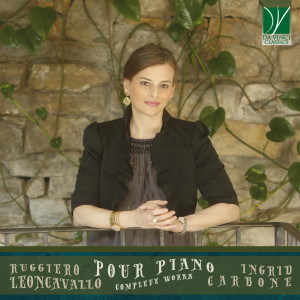
Ruggiero Leoncavallo (1857-1919)
Complete Works for Piano
Ingrid Carbone (piano)
rec. 2022, Classica Viva, Italy
Da Vinci Classics C00629 [78 +77]
Ruggiero Leoncavallo is known for his stage works … or maybe that should be stage work as Pagliacci is the only one that many people would think of; there are several others operas including La Bohème, never as successful as Puccini’s version written at much the same time and Zazà that once attracted singers like Geraldine Farrar and Guiseppe de Luca. What one doesn’t think of is his piano music; indeed I was not aware he had written any until this two CD set arrived. Packed with nearly forty pieces it soon becomes clear that this is music for the domestic amateur market, mostly melodious character and dance like pieces with no huge technical demands.
The longest piece on the disc, the Flirt-Walzer, coming in at a smidge over ten minutes, is a suite of waltzes à la Johann Straussandis just one of many valses on thedisc. I find it overstays its welcome somewhat with rather undistinguished melodies and more interesting for me are the Valse à la Lune, a melancholy serenade with an almost despairing turn of notes to introduce it and Pantins vivants that has echoes of Chopin’s A minor Waltz from op.34 in its melody. The little scherzo Papillon is a waltz in all but name as are the slow waltzes Primo Bacio andthe serene Invocation à la Muse. There are Barcarolles here too and these are amongst the most attractive pieces on the disc; the lilting Gondola with its delicate figuration, the attractive melody of the Barcarola Veneziana and the Nights of Italy which could almost be a Neapolitan song. Dolce notte aspires even more so to Neapolitan song-without-words status, its sweet melody crying out to be sung. Alongside these more modern forms Leoncavallo gives us a host of ancient dances though their harmonies and style are no more ancient than the manuscript he wrote them on. Thus a gagliarda and a Gavotte that are part formal dance and part music box, a grand Sarabande with a graceful minuet at its heart – and with faint echoes of Gluck’s Dance of the blessed spirits in its notes – and two minuets that are closely related, the menuet and Harlequin’s minuet whose impish outer sections are the same though they go different ways in their central trios. Amongst the other solos are a dreamy notturno, a spirited tarantella that might just test an amateur’s fingers and a very short set of variations on Yankee Doodle and Dixie dedicated to President Roosevelt. Harmonically more challenging is the Cortège de Pulcinella, a companion piece for Gounod’s Funeral march for a Marionette, a galumphing little dance whose melody side-steps nimbly from key to key seemingly at random while Bohèmienne is a curious and highly enjoyable mix of polka and Egyptian dance. The closest Leoncavallo gets to a united collection is his Spanish Album consisting of four works, the third separated from its companions here for some reason. The last number, Granadinas is the one that sounds most authentic to me with its long improvisatory introduction, the serenade like main tune not entering until almost half way through the piece. Finally mention must be made of the Triumphant march for the heroic Italian army of Tripoli, brief but indeed heroic with an ending that is bizarrely the final bars of Mendelssohn’s Wedding march; It appears to have been a commission presumably for a military wedding but it is certainly a curiosity.
Ingrid Carbone plays these pieces competently and cleanly with little extrovert passion and for the most part this is effective – these are rarely works of great passions – but I would have liked a bit more vim in the more extrovert works such as the Yankee Doodle variations. Along with the essentially restrained salon nature of the works it is probably better to dip in rather than taking in the whole CD at a time but it is nonetheless interesting to become acquainted with this very little known side of Leoncavallo’s art especially as many of these pieces would be very hard to find in print. The booklet, in English and Italian, includes several colour picture postcards showing Calabria, Leoncavallo’s birth town, Montalto Uffugo where he grew up and other scenes as well as a photo of him at the piano with several, un-named individuals standing around the instrument.
Rob Challinor
Availability: Da Vinci Edition
Contents
CD1
Notturno
Papillon – scherzo
Spanish Album III – Playeras ancienne
Nights of Italy – Intermezzo
Au bord du Lac – Rêverie
Barcarola Veneziana
Bohèmienne
Dolce notte – Romance
Flirt-Walzer – valse passionée
Cortège de Pulcinella – Petite marche humoristique
Menuet d’Arlequin
Primo Bacio
Valse à la Lune – sérénade Française
Valse mélancolique
Chanson d’Amour
Tema di Marcia Trionfale per l’Eroica Armata Italiana di Tripoli
Marcia Yankée – Viva l’America (1906)
Brise de mer – Impromptu (1904)
CD2
Pantins vivants – danse de caractère
Invocation à la Muse
Sérénade-Valse – Sérénade napolitaine
Marcia nuziale
Sous les palmiers – Rêverie Arabe
Menuet
Romanesca – un morceau de style ancien
Sarabande – danse ancienne
Gavotte
Gagliarda – danse ancienne
Gondola
Tarantella
Spanish Album I – sevillana
Spanish Album II – gitano-tango
Spanish Album IV – Granadinas
Valse coquette
Valse mignonne
Sérénade


















